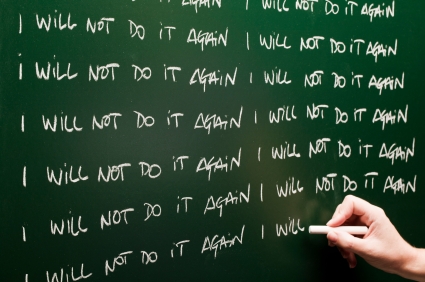We live in a morally backwards society. Our culture had deteriorated to the point where people aren’t supposed to be ashamed of anything that violates traditional morality and be ashamed of everything that does. Self-esteem trumps righteousness. The Social Justice Warriors (SJWs) are big on employing shame, but it’s wrongly applied because it’s not based on righteousness, it’s based on whatever they’re feeling at the time. They will try to shame you for standing up for what is right. The supposedly “progressive” elements of Western Civilization are Neo-Puritan busybodies doing their level best to flip the script. Their time has run out.
 Shame used to have a place in this society and for the most part, it was rightly applied. Getting divorced without a really good reason was shameful. Getting pregnant before getting married was shameful. Having an abortion was shameful. Having an affair was shameful. Being on welfare was shameful. Living together outside of marriage was shameful. What’s shameful now? Not embracing homosexuality, being judgmental, being too masculine, etc. If the SJWs had their way, the things they hate would be blatantly illegal and The Men of the West would be in jail.
Shame used to have a place in this society and for the most part, it was rightly applied. Getting divorced without a really good reason was shameful. Getting pregnant before getting married was shameful. Having an abortion was shameful. Having an affair was shameful. Being on welfare was shameful. Living together outside of marriage was shameful. What’s shameful now? Not embracing homosexuality, being judgmental, being too masculine, etc. If the SJWs had their way, the things they hate would be blatantly illegal and The Men of the West would be in jail.
You know what you should and should not be ashamed of. Never be ashamed of doing what is right; but when you don’t, let shame be your guide. Shame, when properly applied serves as a corrective factor on an individual and societal level. The person who should be ashamed and is not should face exile or be ostracized. Shame is not forever though (for the most part). When you screw up, own up to it and correct yourself. Be a decent person.
How do you apply shame correctly? Shame can be be applied in many different ways, in many different scenarios, but in every case it should be done for the good of the person and not for your own gratification. Apply it judiciously and sparingly or it loses its effectiveness. Sometimes it’s as easy as standing up for your values and saying “that’s wrong.” Sometimes you have to cut someone out of your life. If you’re dealing with a friend or family member, take another friend along. Follow the Biblical model. Sometimes it’s a disapproving look or a snort of derision. Sometimes it’s refusing to participate in someone else’s sin. Sometimes, and this should be rare, you berate someone openly; but only employ that method for the most egregious behavior.
I’d be interested in hearing your stories of shame and course correction no matter which end of it you were on, let me know in the comments.







I swear to God if some reader decides this means they should shame me for using to many ellipses…
If you’re not ashamed by now, you never will be.
If THIS makes them decide that? How many new readers do… you think… you’re going to… have?
People… just have…. to understand… that you speak… like… William Shatner in Star…. Trek
Second sentence is a bit awkward/redundant. You could change it to say “[…]and take pride in everything that does” violate traditional morality. Or just drop the second half of the sentence.
Great article. Shame serves a great purpose in moving society toward virtue. Thing is, what person A thinks is virtuous behavior is abhorrent to person B. I think a holistic view is needed, as in, will society be in a healthy place as a result of this shaming of certain behaviors? Will people know self-worth, the value of work and family, respect for leaders not based on fear, but admiration?
I doubt that I agree with you on exactly what makes something virtuous, but shame is definitely important to that end.
My ‘shame’ rule has been “don’t do something that involves the police, FBI, the Pope or my mother hanging their head over”, never say something you’d want your three year old repeating. Now, given I’ve been lawless in my life I’ve failed that on more than…a few…occasions. My three year old DID repeat something I obviously said often enough for her to understand the meaning and context of: Tracy, be careful!
I never want to apologize for something I’ve said – that has kept my mouth shut more often than anything else.
But. I agree that shame has a purpose, and it’s misuse has been given as a reason to do shameful acts – much like the over/misuse of ‘racism’ has destroyed it’s force, but also been seen on occasion to excuse actual racism.
I will ask you: 1) if a woman gets pregnant outside of wedlock, and/or 2) has an abortion – is the ‘father’ shamed as well? Because often in the abortion ‘debate’, it is, IS, the woman that can stop the sequence of events, but she didn’t engage in it alone. Adultery is another seemingly one sided situation.
I would like it if men shamed other men over the sexual behavior. I’ve engaged in morally repugnant behavior – I understood it then, and note it now as such. Conviction of the Spirit exists, but society has given too much a pass on actions destructive to the person, families and communities (and of course, our governments) that it is easy to ignore. I am responsible for my choices and the consequences thereof. Shame won’t work on me – I’ve judged myself on a higher standard.
But I fully support shaming in communities to establish standards. I know what standard would be used here.
Any man who participates in an abortion should also be shamed. Realistically speaking, men behaving badly (sexually) is never going to elicit the same shame factor as women; thus it has always been throughout history. However morally reprehensible it is, men will always get a pass on having higher numbers of sexual partners. Women are the gatekeepers of sex and the keepers of virtue. Yes, it’s double standard and I’m fine with that.
This of course excludes actual cases of forcible rape, but that’s another discussion entirely.
Quoting myself!
“It has been said that all we can reasonably expect of a society based on an imperfect humanity is “one with some evils, maladjustments and suffering”. Why? Why not work to eliminate evils, maladjustments and suffering? Accept them as the natural consequence of an imperfect humanity? I agree we are imperfect, but that does not give us license to ignore those imperfections. What is worse is to allow institutions WE create to result in evils, maladjustments and suffering by design. Knowing such evils exist and to do nothing but accept the imperfection is to deny our own evil.”
You accept the double standard because 1) it is historical, 2) it’s the woman’s responsibility, 3) you accept a degree of moral reprehensible behavior that benefits you, 4) all of the above.
For women, there’s a much greater externality involved than with a man. A sexually irresponsible man can blend back into the scenery while a woman has to exhibit the irresponsible behavior for the greater part of a year. Abortion is society’s sick, twisted attempt to remove that externality. But as Albert Jay Nock said, nature takes her own time, sometimes a long time, but she demands every penny.
Bingo. The double standard is not fair, but it is load-bearing for society. Both men and women are morally obligated to be chaste, but chastity aligns more closely with women’s long-term interests with respect to marriage. After all, men tend to value a woman’s virginity while women are more likely to look in askance at a man’s. Generally, it works better when we entrust the guardianship of purity to those who have a vested interest in actually guarding it.
Fairness is a subjective idea. What I think is fair is really irrelevant. Only God above can administer true justice, and He will. He created man and woman to be different, and therefore, different things are required of them. Women are the keepers of chastity. This is one area in which, as long as they are not married, they have complete and total authority. With authority comes responsibility. When married, both husband and wife are obligated to be given to the other, and only each other. But until then, men will always be driven by sexual desire, and women will always be held accountable to keep that desire at bay until marriage. May not be “fair”, but that is observably the way God designed us.
What utter nonsense and retarded confusion!
There is no “double standard” at all.
Get it into your THICK HEADS: Men and Women are not equal!
Never have been, never will be.
Women are RIGHTFULLY shamed more for having more sexual partners or indiscriminate sex because they are the ones who mostly allow or deny access to it.
You can be a 3 in looks as a woman and STILL have sex every night with someone without paying for it. Not so for men who are a 3 in looks.
Men are wired to seek sex, women control that access. Generally, in proportion to the safety and security or status they can get from allowing that access.
A loose woman cheapens and denies ALL women their value, and because of it, the harshest critics of slutty women are INVARIABLY other women.
Women who give their sexual favours easily and readily are generally whores who do so for an economic exchange, or silly women who have bought into the feminist bullshit, or broken girls who had no model for how to value themselves and are generally sensual and sexual.
“Women who give their sexual favours easily and readily are generally whores ”
Ok. So what about the men who are also wildly promiscuous? Well, they certainly don’t get the same condemnation, and I don’t expect them to, what is the boundary of decency for them?
I shake my head when I hear those who claim that shame itself is from Satan and no Christian should ever feel shame.
Like any emotion, shame is something that needs to be cultivated before its of any use. Having refused to be civilized in this respect, we’ve become a nation of emotional barbarians with little perspective on exactly what we should be ashamed of.
Parents, our kids are going to feel ashamed no matter what their lives entail–you can’t cut out that part of them. But part of our job as parents is to nurture and guide it so that they are ashamed of shameful things. Some of my own stories on shame are here: http://matthewcochran.net/blog/?p=604
I’ve read you for a long time, Phantom, and I have to say, some of the succinct statements you make here are some of the most impacting I’ve read from you. Excellent.
Stories of shame:
The time I got caught shoplifting and had to spend 8 hours in a holding cell? That was a thing.